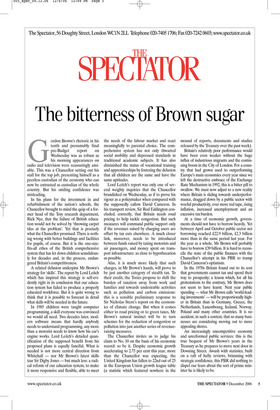The bitterness of Brown sugar
Gordon Brown’s rhetoric in his tenth and presumably final pre-Budget report on Wednesday was as robust as his morning appearances on radio and television were reassuringly amiable. This was a Chancellor setting out his stall for the top job, presenting himself as a peerless custodian of the economy who can now be entrusted as custodian of the whole country. But his smiling confidence was misleading.
In his plans for the investment in and refurbishment of the nation’s schools, the Chancellor brought to mind the quip of a former head of the Tory research department, Rick Nye, that the failure of British education would not be solved by ‘throwing carpet tiles at the problem’. Yet that is precisely what the Chancellor promised. There is nothing wrong with better buildings and facilities for pupils, of course. But it is the one-sizefits-all ethos of the British comprehensive system that has let down children scandalously for decades and, in the process, endangered Britain’s competitiveness.
A related delusion underpins Mr Brown’s strategy for ‘skills’. The report by Lord Leitch which has inspired this strategy is self-evidently right in its conclusion that our education system has failed to produce a properly educated workforce. But it is quite wrong to think that it is possible to forecast in detail what skills will be needed in the future.
In 1985 children were taught computer programming, a skill everyone was convinced we would all need. Two decades later, modern software means that hardly anybody needs to understand programming, any more than a motorist needs to know how his car’s engine works. Lord Leitch’s detailed quantification of the supposed benefit from his proposed plans is equally fanciful. What is needed is not more central direction from Whitehall — nor Mr Brown’s latest skills tzar Sir Digby Jones — but much less: a radical reform of our education system, to make it more responsive and flexible, able to meet the needs of the labour market and react meaningfully to parental choice. The comprehensive system has not only thwarted social mobility and depressed standards in traditional academic subjects. It has also diminished the status of vocational training and apprenticeships by fostering the delusion that all children are the same and have the same aptitudes.
Lord Leitch’s report was only one of several weighty inquiries that the Chancellor brandished on Wednesday, as if to prove his rigour as a policymaker when compared with the supposedly callow David Cameron. In his transport review, Sir Rod Eddington concluded, correctly, that Britain needs road pricing to help tackle congestion. But such measures will command public support only if the revenues raised by charging users are offset by tax cuts elsewhere. A much closer link, moreover, needs to be introduced between funds raised by taxing motorists and air passengers, and money spent on transport infrastructure: as close to hypothecation as possible.
Alas, it is much more likely that such charges, in Mr Brown’s hands, will prove to be just another category of stealth tax. To their credit, the Tories propose to shift the burden of taxation away from work and families and towards undesirable activities such as pollution and carbon emissions: this is a sensible preliminary response to Sir Nicholas Stern’s report on the economics of climate change. But when it comes either to road pricing or to green taxes, Mr Brown’s natural instinct will be to turn schemes for the reduction of congestion or pollution into just another series of revenueraising measures.
The Chancellor invites us to judge his claim to No. 10 on the basis of his economic record: so be it. Despite economic growth accelerating to 2.75 per cent this year, more than the Chancellor was expecting, the United Kingdom has fallen to 22nd out of 25 in the European Union growth league table (a statistic which featured nowhere in the mound of reports, documents and studies released by the Treasury over the past week).
Britain’s relatively poor performance would have been even weaker without the huge influx of industrious migrants and the continuing boom in the City of London. For a country that had grown used to outperforming Europe’s main economies every year since we left the destructive embrace of the Exchange Rate Mechanism in 1992, this is a bitter pill to swallow. We must now adjust to a new reality where Britain is sliding towards underperformance, dragged down by a public sector with woeful productivity, ever more red tape, rising inflation, increased unemployment and an excessive tax burden.
At a time of economic growth, governments should not have to borrow heavily. Yet between April and October public sector net borrowing reached £22.9 billion, £2.3 billion more than in the same period last year. For the year as a whole, Mr Brown will probably have to borrow £39 billion. It is hard to reconcile the state of the public finances with the Chancellor’s attempt in his PBR to trump David Cameron’s optimism.
In the 1970s Britain found out to its cost that governments cannot tax and spend their way to prosperity; a lesson which, for all his protestations to the contrary, Mr Brown does not seem to have learnt. Next year public spending — what Mr Brown calls ‘world-leading investments’ — will be proportionally higher in Britain than in Germany, Greece, the Netherlands, Luxembourg, Iceland, Norway, Poland and many other countries. It is no accident, in such a context, that so many businesses are considering moving out to more appealing shores.
An increasingly uncompetitive economy and unreformed public services: this is the true bequest of Mr Brown’s years in the Treasury as he prepares to move next door in Downing Street. Awash with statistics, built on a raft of hefty reviews, brimming with strategic confidence, this PBR did nothing to dispel our fears about the sort of prime minister he is likely to be.


























































































 Previous page
Previous page